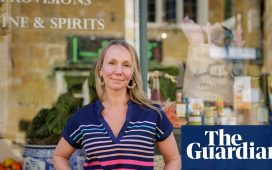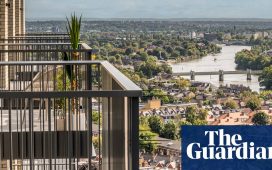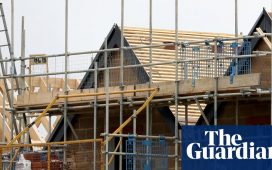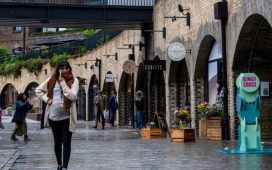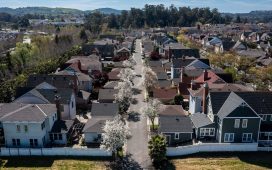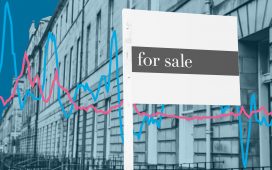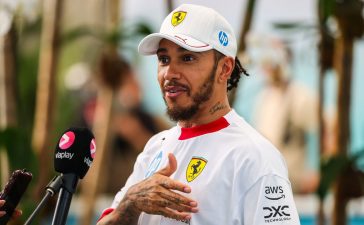Shares in Hong Kong’s four biggest family-owned developers have dropped more than a third in the past four years, with nearly $50bn wiped off their market capitalisation as Covid-19 restrictions and interest rate rises took a toll on the property market.
Four families dominate the Hong Kong property market: the Lis of CK Asset, the Kwoks of Sun Hung Kai Properties, the Lees of Henderson Land and the Chengs of New World Development.
The share prices of their Hong Kong-listed stocks have fallen by an average of about 35 per cent since April 2019, with their combined market value falling from about $132bn to $86bn by the end of March. New World and Henderson had the biggest declines, of 62 per cent and 40 per cent respectively.
“It is definitely a tougher time than it has been in the past,” said John Burns, an honorary professor of politics and public administration at the University of Hong Kong. On top of the property slide and the 2019 protests that hit the economy, Beijing “has been marginalising tycoons”.
Under a policy established during British colonial rule, only a tiny group of deep-pocketed families can bid for land plots at government auctions. Rising property prices over the past several decades have fuelled the expansion of these families into retail, infrastructure and telecommunications.
But against the backdrop of a 40 per cent drop in home sales and a 15 per cent fall in residential property prices last year, underlying profits at Sun Hung Kai, the city’s largest developer by market value, and New World Development fell 36 per cent and 14 per cent respectively for the six months ended December 2022, while underlying profit at Henderson Land fell 29 per cent in the whole of last year.
CK Asset, founded by Hong Kong’s richest man Li Ka-shing, posted a 2 per cent gain in profit last year despite revenue from property sales in Hong Kong and mainland China falling 30 per cent, as asset disposals and a return to profit by its UK pub business Greene King helped buoy overall returns.
Developers were also hurt by tough lockdowns in mainland China, where their combined revenue last year was $4.8bn, down 40 per cent from the year before and the lowest since 2019.
The tycoons’ political influence has also weakened. Victor Li, the elder son of Li Ka-shing and chair of CK Asset, was in March stripped of his role on the standing committee of China’s top political consultative body. Victor Li will stay on as a member of the body but the move shocked analysts.
“It’s really odd for someone to remain as just a member on the CPPCC [Chinese People’s Political Consultative Conference] but doesn’t get to stay on the standing committee,” said a pro-Beijing politician.
In a statement, Victor Li said he had held the standing committee position for two decades and there were “many ways to serve the country”.
Analysts and pro-Beijing politicians suggested the move symbolised the Li family’s waning favour with Beijing, after Li Ka-shing was accused by Beijing’s Central Political and Legal Affairs Commission of “condoning crimes” by pro-democracy protesters in 2019.
Ho-fung Hung, a professor of Chinese political economy at Johns Hopkins University, said Beijing’s distrust of Hong Kong business magnates was also evident in moves to reduce their power in the city’s de facto parliament.
“Beijing has been working to reduce the political influence of HK business tycoons . . . this is all part of the shift of Beijing policy from allying with private entrepreneurs in the mainland and Hong Kong [under previous Chinese leaders] to suspecting and even repressing the influence of them under [President Xi Jinping],” he said.
As home ownership remains largely unaffordable to most residents of the highly unequal city, tycoons have faced pressure to build more housing. “[Beijing is] basically telling them: We need your co-operation, we need your help. But you must work with us on our policy priorities,” said Burns.
The weak property market has also presented an opportunity for Hong Kong’s property barons.
CK Asset and Sun Hung Kai have become two of the territory’s most active bidders for residential and commercial land as Chinese developers, hamstrung by Beijing’s clampdown on property sector debt, remained on the sidelines and foreign businesses reduced exposure to the market.
While a glut of new office space is expected to come on to the market in the coming years, there are some signs of recovery in the wider property sector. In early March, Sun Hung Kai sold all 352 flats in a new project for more than $255mn. Prices of existing homes have climbed at least 7 per cent since the beginning of the year, according to Hong Kong property agency Centaline.
Heron Lim, an economist at Moody’s Analytics, said: “Hong Kong property developers have not seen a debt exposure akin to their mainland Chinese counterparts.” In the event of a recovery, “the Hong Kong firms could be well positioned”.
Hong Kong’s property tycoons
Four families’ patriarchs and next-generation leaders

Li Ka-shing, 94
Founder, CK Asset Holdings
Li Tzar-kuoi, Victor, 58
Chair, CK Asset Holdings

Lee Shau-kee, 95
Founder, Henderson Land Development
Lee Ka-shing, Martin, 51
Lee Ka-kit, Peter, 59
Co-chairs, Henderson Land Development

Cheng Kar-shun, Henry, 76
Chair, New World Development
Cheng Chi-kong, Adrian, 43
Executive vice-chair and CEO, New World Development

Kwok Ping-luen, Raymond, 71
Chair, Sun Hung Kai Properties
Kwok Kai-fai, Adam, 40
Executive director, Sun Hung Kai Properties
Photographs: Bloomberg/AFP/Getty Images/ImagineChina/SCMP/Reuters

